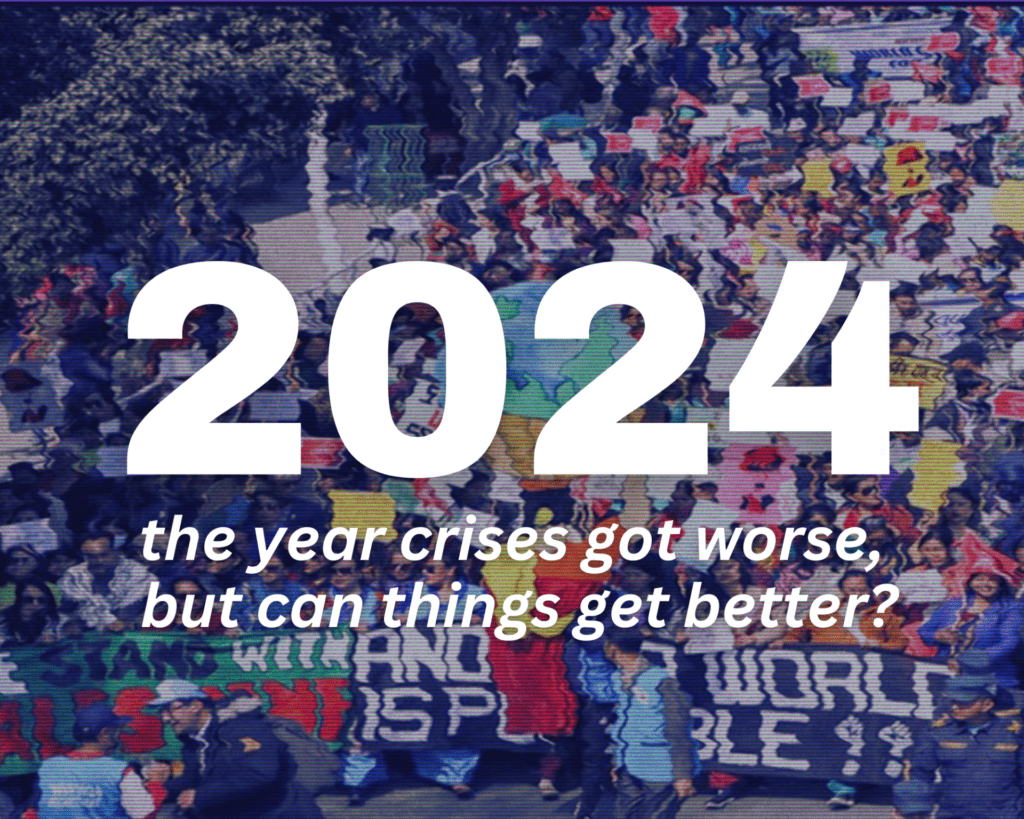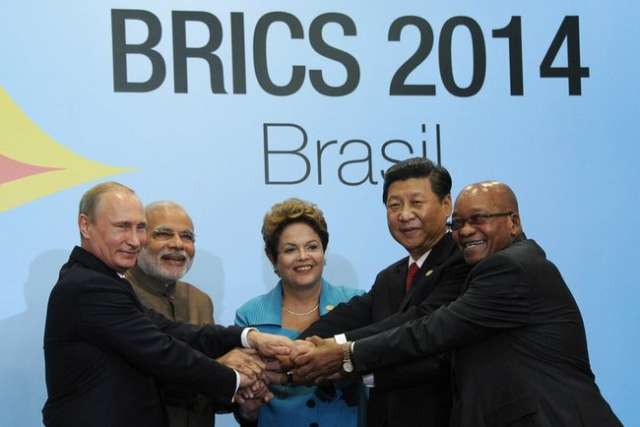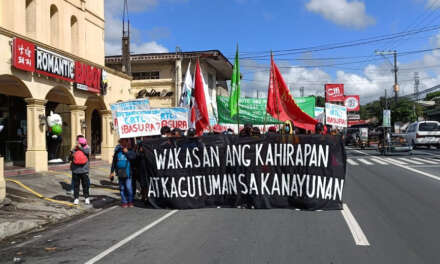
December 30 2024
Focus on the Global South
Two thousand and twenty-four was marked by three major disasters: the continuing genocide perpetrated by Israel in Gaza, the victory of Donald Trump in the US elections on November 5, and the magnification of climate change-induced extreme weather.
In Gaza, spitting at global public opinion, Israel continued its massacre of Palestinians by airstrikes and ground assaults, bringing to over 45,000 the number who have been killed since October 2023. Israel extended its bombing of civilians to Lebanon, where it sought to wipe out Hamas’ ally Hezbollah, and its planes also struck Iran and Syria. Despite its feigned concern about the victims of genocide, the US continues to be an accomplice of the Israeli actions, spurning calls to end the massive military assistance that has enabled Israel to carry out its unrestricted military atrocities, territorial expansionism and human rights violations.
Coming on the heels of four disastrous years under Joe Biden, the election of Donald Trump as US president promises an even greater catastrophe. Rampant inflation, inability to formulate a policy on migration, wars in Ukraine and Gaza, the threat of escalating conflict in the Asia-Pacific region, and Biden’s refusal to acknowledge he was physically unfit to remain in office doomed Vice President Kamala Harris’s presidential candidacy. A denialist, Trump in office will certainly be bad for the climate, and he is almost certain to withdraw the US from the 2015 Paris Accord. He will almost certainly be bad for women, migrants, and minorities.
In foreign policy, Trump is likely to be even more aggressive than Biden in his support of genocide in Gaza, though he will most likely moderate US support for Ukraine. He is likely to escalate the economic confrontation with China, though it is not certain whether he will also heighten the military confrontation with Beijing. Unpredictability was a trademark of Trump’s first presidency; it is also likely to be a feature of Trump II.
In 2024, far right forces continued to make electoral gains in Europe. National elections in Thailand, Cambodia and the Philippines (2022) resulted in the consolidation of authoritarian regimes that rule with impunity, albeit with significant pushback from civil society organising in creative ways and demanding participatory democracy. In India, although the Modi regime suffered a setback when it fell short of gaining an absolute majority of parliamentary seats that would have allowed it to rule without coalition partners, parliamentary opposition has so far proved ineffective in curbing the BJP’s excesses.
The Global Economy: Recalibration, Risks and Uncertainty
Global trade expanded in 2024 driven mainly by growth in trade in services with growth in ICT and garments pushing the slower growth rates in goods trade. UNCTAD, however, sees uncertainty looming ‘over 2025 amid risks of trade tensions and ongoing geopolitical challenges’.
The re-globalization agenda is still in full swing with the continued, and in some cases re-energized push for trade and investment agreements as instruments to secure the access and control over critical minerals and energy sources amidst supply chain vulnerabilities laid bare by continuing crises and China’s control over these resources.
Regionalization has emerged as a key response to the geopolitical dynamics and continuing economic challenges as major powers (US, China and the EU) push for the consolidation of regional partnerships.
The Indo-Pacific region continued to be the key target for economic expansion. Biden’s Indo-Pacific Economic Framework for Prosperity (IPEF) Agreement is three fourths complete with the conclusion of key agreements on supply chains, the environment, and good governance. Only the most contentious trade pillar still remains in negotiation on the agenda. Trump’s second term however could put a giant monkey wrench in and jeopardize the whole IPEF agreement. During the 2024 US elections, trade was an electoral issue that divided voters over the possible return of Trump’s tariffs and trade wars, particularly with China. The IPEF was promoted as a new approach to trade negotiations emphasizing cooperation and partnerships that would benefit workers and the environment. In many respects, the IPEF represents an attempt to address growing skepticism on globalization and trade policies.
The EU likewise moved to further advance its strategic economic interests in the region by re-invigorating trade negotiations with the Philippines, Thailand, India and Indonesia. Outside the region, the EU-Mercosur trade agreement was finalized in December amidst widespread protests and opposition from farmers across both regions. Peasant-farmers from the European Coordination Via Campesina (ECVC) denounced the deal “as incompatible with achieving generational renewal and ensuring fair prices for small-scale farmers”.
The EU’s own Indo Pacific Strategy purports shared strategic interests between the two regions based on the principle of interdependence and the common desire for peace and prosperity. Yet clearly, the main motivation behind the strategy is to secure the EU’s own strategic interests across its defined priority areas of trade, digital governance, green transition, ocean governance, security and defense, and human security.
Positioning these trade agreements as ambitious but balanced, negotiations emphasized partnerships across not only the traditional areas of trade, but extending to deeper and strategic issues of supply chain resilience and raw materials security. New areas of negotiations include digital trade, energy and access to critical minerals.
At the multilateral level, the WTO continues to struggle to overcome its crisis of legitimacy. The 13th Ministerial Conference (MC13) in Abu Dhabi produced an outcome document that reiterated the WTO’s institutional reform agenda including the need to fix the dispute settlement mechanism. At the end of the year however, the process failed to come up with a final agreement as mandated, as major differences are still evident across the core issues of costs and funding.
The fisheries subsidies agreement adopted at the MC12 in 2022 was again on the agenda at MC13 around the main areas of adoption by Member States of the agreement, and the second wave of negotiations to “formulate additional disciplines targeting subsidies contributing to overcapacity and overfishing, along with corresponding provisions for special and differential treatment to address the needs of developing and least-developed country members”.
As of August 2024, only 62 Member States out of the 166 total membership of the WTO have submitted instruments of acceptance to the fisheries agreement, falling short of the required two-thirds majority for the agreement to enter into force. Member States also failed to conclude the so-called second wave negotiations at MC13.
Another continuing area of concern at the WTO are the Joint Statement Initiatives (JSIs). JSIs represent a push by a few Member States to jump start discussions towards plurilateral agreements on the areas of electronic commerce, investment facilitation for development, micro, small and medium enterprises (MSMEs) and services domestic regulations. As of July 2024, the JSI on electronic commerce agreed on a final “stabilized” text. By December however, 20 States including among others Brazil, Indonesia, the Philippines, Thailand and the United States decided to drop out of the consensus on the final text.
The JSIs, which emerged in 2017 have been criticized by progressive trade analysts for being “illegitimate and undermining multilateral trade rules”.
Climate disasters amidst COP-outs
Amidst unbridled neoliberal capitalism and the greater financialization of the tragedy of the climate crisis, extreme weather events have increased in frequency and intensity, have become the new normal, and have had significant implications particularly for communities in the global South. The year 2024—the hottest year on record according to the latest report of the World Meteorological Organization—saw three Conferences of Parties (COPs) on the important and intersecting issues of biological diversity (COP16 to CBD), climate change (COP29 to UNFCCC), and land and drought (COP16 to UNCCD). Yet, such high-level conferences in their various editions have repeatedly and largely failed to deliver adequate action, vital resources, and real solutions to address the planetary emergency. Global peoples’ movements have explicitly denounced these as “cop-outs,” “hot air summits,” and “Conference of Polluters,” from which outcomes only point towards the conclusion that “no deal is better than a bad deal.”
In the current conjuncture of fragmentation and corporate capture of multilateral spaces including the COPs, the global North’s shirking of their historical responsibilities and the lack of political will to effect wide-ranging, large-scale, rapid, and systemic transformation to address these debacles have become more stark. Consequently, business-as-usual approaches and false solutions under green capitalism such as “global carbon markets,” “biodiversity credits,” and the greater commodification of nature must be contested and resisted. And as multilateralism continues to fail to tackle global challenges and existential crises such as the climate emergency, the emergence of autonomous, decentralised responses that build synergies across alternative strategies by people, communities and local governments, remain an imperative.
G20 and BRICS: a challenge to the status quo?
The western dominated international order is at a breaking point. The rules of global governance continue to be stacked against developing countries and the developed world undermines negotiations and blocks progress at various multilateral fora on climate, biodiversity, finance, trade, taxation, peace and debt.
It would be foolhardy to view the G20 and BRICS as pushing for genuine democratic people’s alternatives to the multiple crises that the planet faces. The track record of the G20 since 2008 (when the annual leaders summits began) has shown that it functions as an extension of the G-7 group of rich countries despite membership of some large developing countries. The 2024 Brazil summit in Rio de Janeiro is the latest example where there was nothing concrete except platitudes about global food insecurity, war and climate disasters.
The BRICS Kazan Summit hosted by Russian President Vladimir Putin was more vocal in expressing dissatisfaction against the West and proposed concrete projects to reform global finance: new initiatives such as BRICSpay, BRICSbridge and BRICSclear were announced as a challenge to the dominance of the US dollar and western payment systems such as SWIFT. However, they do not address the structural problems of a world increasingly dominated by finance capital, nor the challenges posed by financialisation to the real economy that sustains the majority of the world’s people. The BRICS declaration continued its support to free trade and investment, and did not challenge the role of the World Bank and IMF in perpetuating the debt crisis in the developing world.
Bright spots and victories
Parallel to the above concerns, there were notable bright spots and victories that served to inspire and reinvigorate people’s movements and campaigns across the globe:
ICJ and ICC Decisions on South Africa’s genocide case vs Israel and arrest warrants of Israeli leadership for war crimes
On 26 January 2024, the International Court of Justice (ICJ) issued provisional measures in Application of the Convention on the Prevention and Punishment of the Crime of Genocide in the Gaza Strip (South Africa v. Israel). The ICJ ordered Israel to take all measures within its power to prevent the commission of all acts within the scope of Article II of the Genocide Convention, and to take immediate and effective measures to enable the provision of urgently needed basic services and humanitarian assistance to address the adverse conditions of life faced by Palestinians in the Gaza Strip.’
On November 21, 2024 the Pre-Trial Chamber I of the International Criminal Court (ICC) issued arrest warrants for Mr. Benjamin Netanyahu and Mr. Yoav Gallant for crimes against humanity and war crimes committed from at least 8 October 2023 until at least 20 May 2024 (the date the Prosecution filed applications for the arrest warrants). The Chamber found that “there are reasonable grounds to believe that both individuals intentionally and knowingly deprived the civilian population in Gaza of objects indispensable to their survival, including food, water, and medicine and medical supplies, as well as fuel and electricity, from at least 8 October 2023 to 20 May 2024” noting their roles in impeding humanitarian aid in violation of international humanitarian law and failure to facilitate relief by all means at their disposal.
UNDROP 6th Anniversary and the UNDROP Working Group
This year marked the 6th anniversary of the adoption by the UN General Assembly on December 18 2018 of the Declaration of Rights of Peasants and Other People Working in Rural Areas (UNDROP); The declaration, supported by 121 Member States, represents global recognition of the important contributions of peasants and other people in rural communities to food production, rural development, protecting and regenerating biodiversity and ensuring the right to food. This year, we also celebrated another milestone, the creation of the UNDROP Working Group, which represents a significant advancement in promotion and implementation of UNDROP, and progressive realization of the rights enshrined in the declaration.
Cultural activists, defying censorship and repressive laws and reprisals, continued to advance progressive ideas and support people’s movements and campaigns across the region. Throughout the year, Focus worked closely with and supported the work of artists who created art in various forms from comics that told stories of everyday resistance in Myanmar, to songs and stories from indigenous women and about the Covid years. Artists also shared short videos that helped popularize themes and issues like global finance and geopolitics and globalization.
Farmers mobilizations across the globe
Across the world, peasants and small-scale family farmers mobilised against the destruction of their livelihoods and abilities to produce healthy sustainable food by decades of industrial agriculture and subsidies for corporate agriculture. It is estimated that ‘national demonstrations have spread to over 65 countries, with farmers protesting against low prices for their crops, the high cost of agricultural fertilisers, unrealistic environmental regulations, unfair trade deals, and government policies favouring corporations over farmers.’
Thirty years of Focus: we commit to advancing progressive peoples’ alternatives
Multiple crises are wracking the world, and they feed on each other to present the greatest threat to the planet and human society since the mid-20th century. Marking its 30th year in 2025, Focus has been a voice calling for a radical overhauling of global politics and the global economy. Over the last three decades, it has pioneered and promoted a paradigm whose key features are deglobalization, participatory democracy, food sovereignty, and expansion of the commons and the public economy. We in Focus have developed our paradigm of change in dialogue with many other progressive forces. More than ever, we are committed to deepening this partnership for progressive change.









